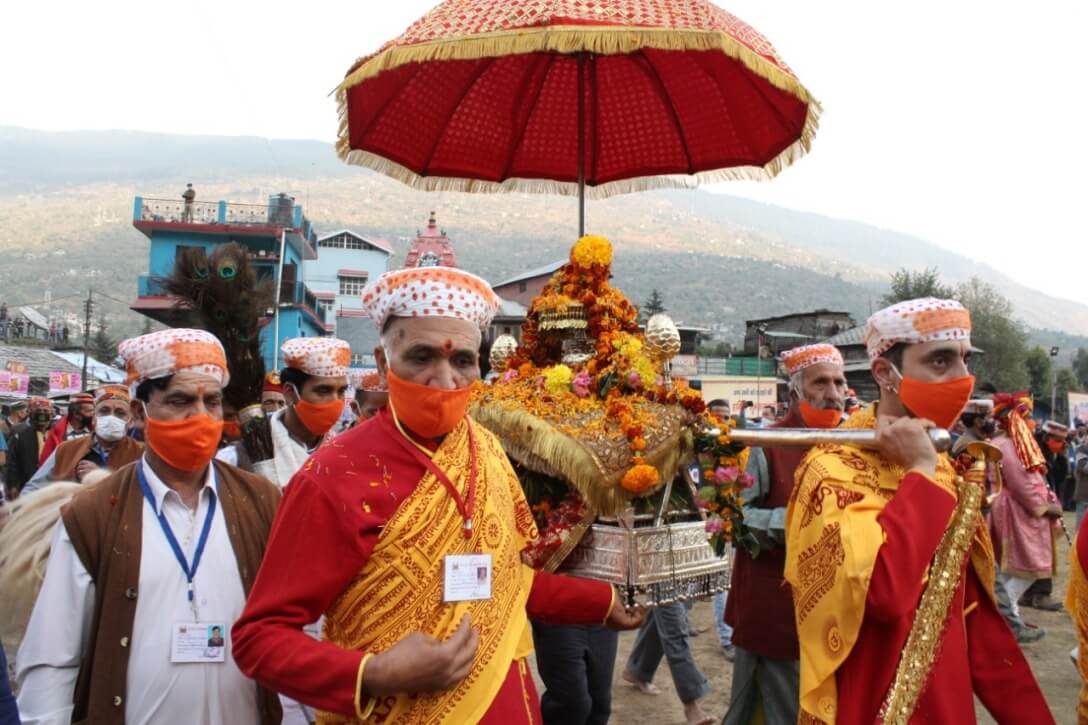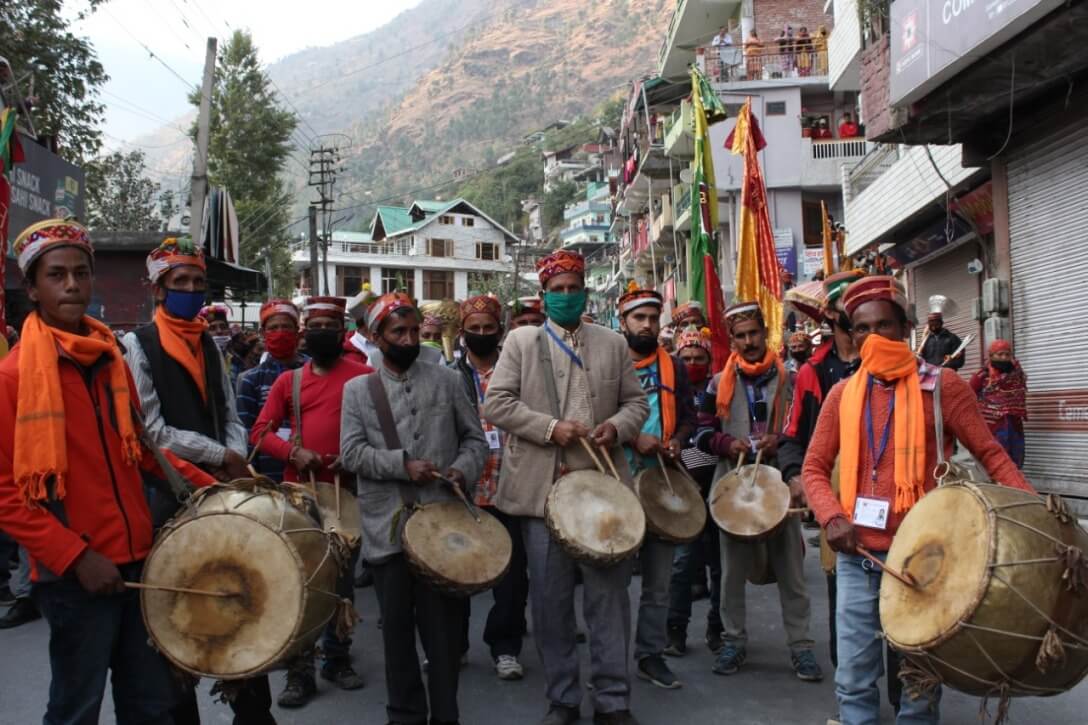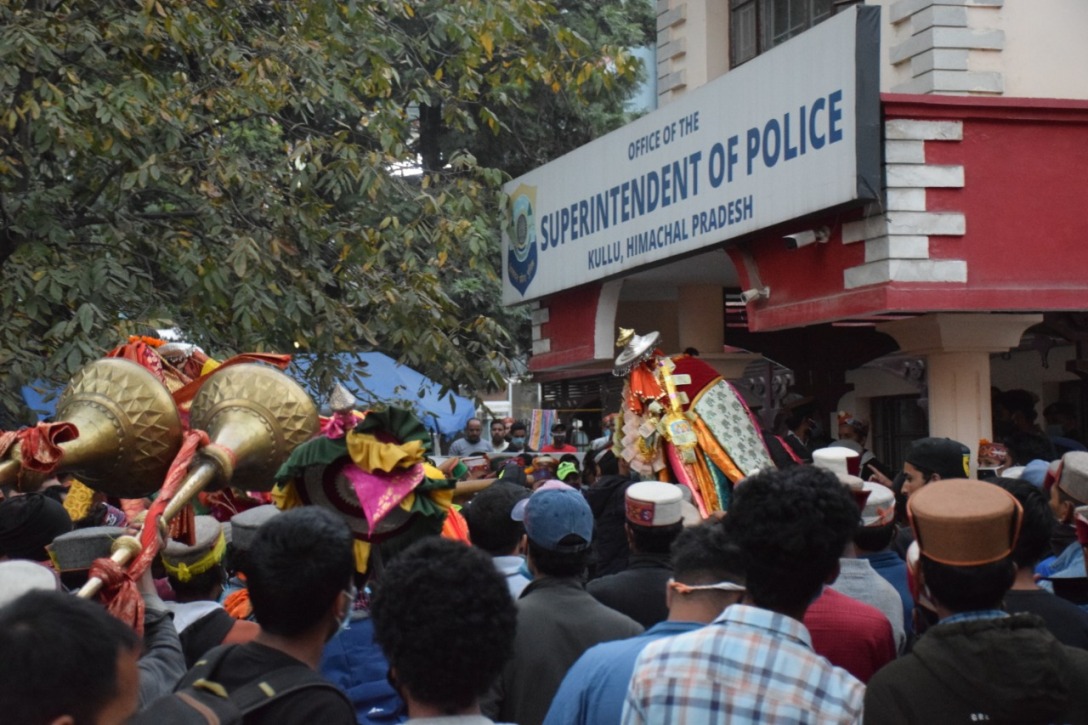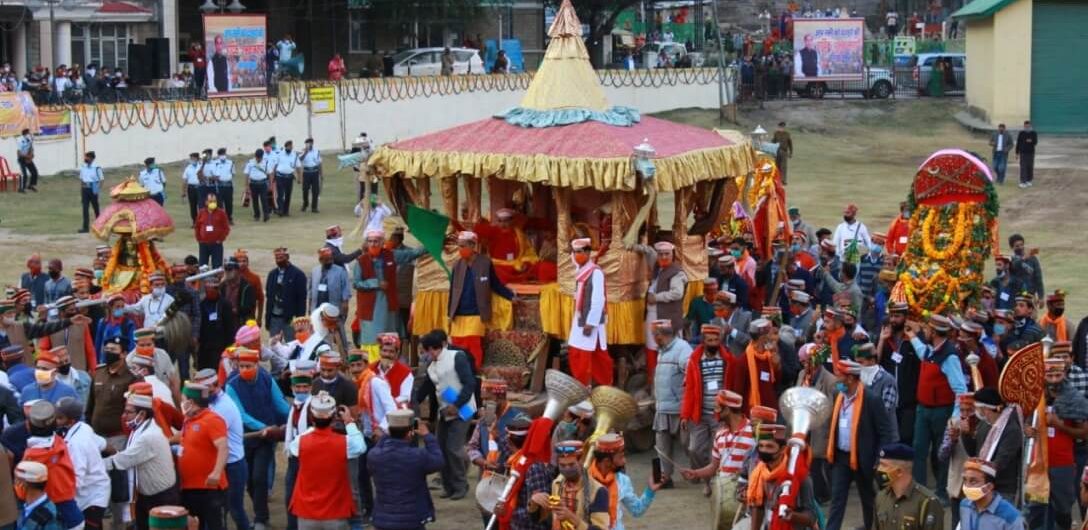While Dussehra ended in rest parts of the country on Vijayadashmi, the weeklong Dussehra festivities of Kullu started on Sunday with the rath yatra of the Lord Raghunath in presence of just eight deities and a limited number of people.
While Kullu Dussehra Committee had sent invitations to 331 deities and thousands of people were present in the rath yatra last year, a limited number of people were present in the rath yatra along with eight deities this year. The deities first paid obeisance to the Lord Raghunath, presiding deity of the festivity and then performed the rituals. The rituals of the festivities start from the royal palace where royal family dressed in traditional attire performs the rituals. Rituals started after arrival of the palanquin of Devi Hidimba. The idol of the Lord Raghunath is then brought to Rath ground for rath yatra.
Not all people were allowed to pull the chariot. Administration had finalised 200 devotees for this purpose. All the devotees pulling chariot and those in procession of the deities had to undergo Covid-19 test. The chariot was pulled from Rath ground to the middle of the Dhalpur ground where it will stay for six days. The valley was echoing with the divine music of drums and trumpets. However, a limited number of musicians were allowed with each procession of the deity. On seventh day the chariot will be wheeled to the bank of Beas river to perform final rituals and then it will be brought back to Rath ground. The deities will camp at historic Dhalpur ground till October 31.

Covid-19 pandemic forced administration not to invite over 300 deities of the valley this year which otherwise had caused huge crowd. Palanquins of only seven deities were allowed to come to Dussehra venue to perform the major rituals. However, a large number of followers brought the palanquin of Lord Nag Dumal, a deity known for its wrath, without invitation. Kullu SDM had recently visited Hallan village to convince the deity Nag Dhumal and its followers not to come to Kullu Dussehra.
Kullu Dussehra, an international level cultural event, has no charm this year due to absence of nearly 300 deities and thousands of followers. The festivity venue does not have cultural and other colourful programmes. International folk dance competition has been cancelled this year. The Kullu Dussehra markets are shut. Even the permanent shops of Dhalpur and nearby areas were made to shut during rath-yatra to make sure that there is no crowd.
A large number of tourists used to witness the unique culture and tradition of Kullu in Dussehra but tourists were not allowed this time. Tourists, especially photographers and research scholars from abroad, used to visit Kullu Dussehra every year. Local residents were also not allowed to come close to the Dhalpur ground and people watched the event on television or from roof of their houses.
Chief minister inaugurates Kullu Dussehra every year. But the CM’s recorded video message was displayed at the festival venue on Sunday. Education minister Govind Thakur, who is the chairman of the Dussehra committee, MLAs from Kullu and officials from local administration were present.
Kullu Dussehra Committee chairman Govind Thakur said, “Covid-19 has forced us to cut short the Dussehra events. Only important rituals are being performed. Lord Raghunath and other deities will camp at Dhalpur ground for seven days where devotees can visit them to pay their obeisance. But people will not be allowed to touch the idols and they need to follow social distancing and wear face masks.”

According to Kullu SP Gaurav Singh, over 600 people jawans have been deployed to check law and order amid pandemic. “The major police deployment will be on first and last day of Dussehra during rath yatra. Nakas have been laid on all roads leading to Kullu town. Section 144 CrPC has been invoked. 90 CCTV cameras and four PTZ cameras have been established for Dussehra security, law and order, traffic management and to check social distancing and face cover,” he said.
Kullu’s seven-day-long Dussehra is unique because its starts on Vijayadashmi when it ends across the nation after burning effigies of Ravana, Kumbhakarna and Meghnath. Unlike other parts of the country, effigies are not burnt in Kullu Dussehra. Dussehra, which conveys message of victory of good over evil, is marked in Kullu by gathering of deities, their prayers, processions and religious ceremonies.
According to historians, the idol of Lord Raghunath was brought to Kullu from Ayodhya in 1651 when Raja Jagat Singh was the ruler of Kullu state. Dussehra celebrations in Kullu started after 1660 when the Raja invited all deities before Lord Raghunath. The people here are still following the same custom. Kullu Dussehra was declared an international festival in 1972.
Update on 31 October 2020
Kullu Dussehra ends with Lanka Dahan
The weeklong Dussehra festivities in Kullu concluded on Saturday after rath yatra and burning of Lanka in presence of a few deities and limited number of devotees.
The chariot of Lord Raghnath, the presiding deity of Dussehra, was pulled by devotees to the lower end of the ground. Palanquin of Devi Hidimba was taken for final rituals to Lanka Bekar where some shrubs and fodder was burnt to mark burning of Lanka. Unlike other Dussehras of the country, effigies of Ravana, Kumbhakarna and Meghnath are not burnt in Kullu Dussehra but the Lanka is burnt to denote victory of good over evil.
Later, chariot of Lord Raghunath was brought back to the Rath Maidan. The palanquins of the deities were then taken back to their respective temples. Some deities will reach back in their temples after on foot yatra for two to three days. No deity from outer Seraj area could participate in the festival. Dussehra festivities at Vashisht, Haripur, Thawa and Manikaran villages of Kullu also concluded on Saturday.
Dussehra of Kullu is unique because it starts when Dussehra in rest parts of the country ends. Unlike last year when 331 deities were invited by Dussehra Committee, only seven deities were invited to the festivity due to Covid-19. The festival was celebrated in the micro form without cultural programmes and without setting up of the temporary Dussehra markets. Himachal chief minister used to conclude the festivity every year but this year he could not come.
Unhappy Kullu deities call “court of Gods”
Not happy with Himachal government, Kullu administration and Dussehra organising committee for stopping deities from participating in historic Kullu Dussehra, the deities of Kullu have called chhoti jagti (mini court of Gods) in Kullu to give their verdict on the issue.
Citing Covid-19 pandemic, Dussehra Committee had invited only seven deities out of over 331 deities of the valley. Kardars, priests and the followers of all the deities are unhappy with the administration and government for their decision. They wanted all the deities to be invited, however, they had agreed on brining limited number of followers wearing face masks and adhering to all the precautions. Palanquins of some deities along with their followers reached the Dussehra uninvited and expressed their displeasure through their gur (the person speaking on behalf of the deity).
Many people along with palanquins of deities reached Kullu deputy commissioner office to seek answer that why administration and government are interfering with deities and religious rituals. When they didn’t get any reply, they reached the superintendent of police office. Then the deities assembled at Dussehra ground. The gur of the deities warned to face the consequences and asked to call a chhoti jagti. They also warned that organisers will have to face their wrath.

Maheshwar Singh, chhadibardar (prime servant) of Lord Raghunath, said, “Deities are angry. They have ordered to call chhoti jagti. The main jagti is a large religious ceremony which is conducted at Naggar. This will be chhoti jagti which can be organised at Kullu’s Raghunath temple. Govardhan Puja day has been finalised for it. This time jagti is being called to discuss issues related to Dussehra.”
In Kullu, whenever people fail to decide on any major issue, a jagti (court of Gods) is called where all deities assemble and given their verdict which is accepted by all without argument. The devotees, public and deities (their gur) were unhappy that when political rallies are being organised, other festivals and weddings are being allowed, why administration and government didn’t invite palanquins of deities to celebrate the largest religious festival of the state.
Maheshwar added that he himself is sad with the behaviour of the administration. “They are warning people with announcement of curfew in Kullu. What does it mean? Are there any riots in the town? Instead of spreading terror, they should have simply announced to maintain social distancing and to wear face cover and should have spread awareness about Covid-19,” he added.



Comments